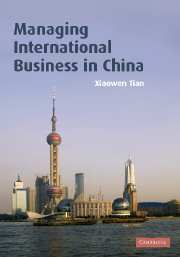Book contents
- Frontmatter
- Contents
- List of figures
- List of tables
- List of boxes
- Preface
- 1 Introduction
- 2 Look before you leap
- 3 Manage guanxi strategically
- 4 Select an entry mode
- 5 Form an alliance
- 6 Negotiating with Chinese partners
- 7 Production operations management
- 8 Marketing management
- 9 Human resource management
- 10 The protection of intellectual property rights
- 11 Corporate finance considerations
- References
- Index
- References
1 - Introduction
Published online by Cambridge University Press: 05 June 2012
- Frontmatter
- Contents
- List of figures
- List of tables
- List of boxes
- Preface
- 1 Introduction
- 2 Look before you leap
- 3 Manage guanxi strategically
- 4 Select an entry mode
- 5 Form an alliance
- 6 Negotiating with Chinese partners
- 7 Production operations management
- 8 Marketing management
- 9 Human resource management
- 10 The protection of intellectual property rights
- 11 Corporate finance considerations
- References
- Index
- References
Summary
Let China sleep, for when she wakes she will shake the world.
Napoleon BonaparteSome 200 years after Napoleon Bonaparte, the brilliant general who became emperor of France, made the above statement, China has indeed begun to wake up and shake the world. In the past twenty-five years China has been the fastest-growing economy in the world, with an average annual gross domestic product (GDP) growth rate of 9 per cent. The rapid economic growth in a country with a population of 1.3 billion implies, among other things, enormous business opportunities, which attract millions of business people to China from all over the world. Doing business with China has now become a fashion, or, rather, a necessity for survival.
In this opening chapter we first discuss China's rise in the world economy in recent decades from a historical perspective, the driving forces behind the rise and the significance of China's rise to international businesses. We then move on to illustrate the rapid pace of developments with regard to international businesses in China, with a focus on the massive inflows of foreign direct investment (FDI). Finally, we analyse the prime challenge faced by transnational corporations (TNCs) operating in China using a four-choice model, and set out the structure of the book.
The rise of China in the world economy
When Napoleon made the above statement about two centuries ago China was a great economic power in the world, as shown in figure 1.1, accounting for just over 30 per cent of world GDP.
- Type
- Chapter
- Information
- Managing International Business in China , pp. 1 - 21Publisher: Cambridge University PressPrint publication year: 2007



